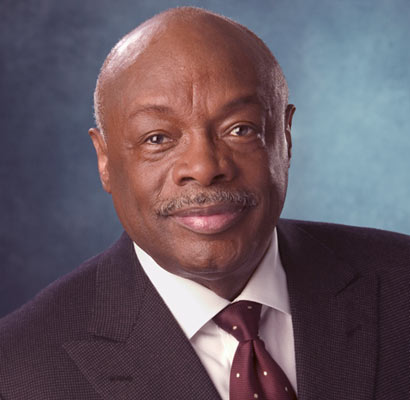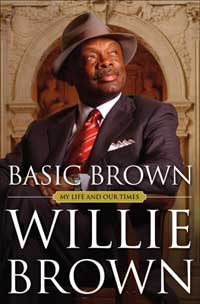An Interview with Willie Brown
Modesty Is Overrated

Willie Brown was on the line, and he had some hindsight advice for Barack Obama, on how the Democratic presidential frontrunner might have finessed the firestorm over his controversial pastor, Rev. Jeremiah Wright.
“If it was me, I’d have bought him a ticket to Rwanda,” said Brown. “Then I’d invite him back for the inauguration.”
Brown punctuated his own wisecrack with a trademark, high-pitched cackle before jumping into another speedball political riff that made Chris Matthews sound like the president of the Slow Talkers of America. “He knew Wright was toxic-why did he keep silent for a year?” Brown asked, voice rising in register as if he’d just inhaled a helium balloon. “I told Obama, ‘Whatever you do, cut the bullshit that you weren’t present'” to hear Wright’s sometimes inflammatory sermons. Perhaps the nation’s most abiding African-American politician, Willie Brown will bring his roguish style of political analysis to Santa Barbara next week in a May 14 appearance at UCSB. The same day, he is scheduled to headline a fundraiser for the county’s Democratic central committee in Goleta.

The 74-year-old liberal Democrat-who shattered all longevity records by serving 15 years as speaker of California’s Legislature and then won two terms as mayor of San Francisco-has since launched a second, senior statesman career, both opining as an MSNBC talking head and advising other politicians from the Willie L. Brown Jr. Institute on Politics & Public Service in the city’s landmark Ferry Building. In his spare time, he recently published a political memoir, Basic Brown: My Life and Our Times. Like most of its genre, Brown’s work is often an exercise in self hagiography, in which the man once dubbed the “Ayatollah of the Assembly” routinely refers to himself in the third person and notes that when he walks “into a party or public dinners or other social gathering, instantly all the attention is focused on me.”
“Modesty is highly overrated,” Brown told me from San Francisco. “I wasn’t writing a balanced book. Why would I? It’s my fuckin’ book.”
Unlike most other political autobiographies, however, Basic Brown is also candid, engaging, and funny because much of it consists of tape transcriptions of Brown’s informal raconteur and recollection sessions with collaborator and San Francisco Examiner columnist P.J. Corkery. The unusual method takes advantage of Brown’s huge talent for shoot-from-the-hip verbal improvisation, a style that is one part Adam Clayton Powell, one part Samuel L. Jackson, and one part Richard Pryor.
Brown’s sharp intelligence, sharp tongue, and sharp fashion sense combine with an encyclopedic knowledge of backroom politics to offer a true insider view of a half-century of events, from the historic (delivering his memorable “Give me back my delegation” speech to the Democratic convention in 1972) to the hardball (thumbing his nose at an FBI task force investigating the state Capitol by playing a flamboyant and corrupt politician in The Godfather: Part III in 1990) to the hilarious (handling fallout from a bizarre and scandalous birthday party, featuring sodomy and sadomasochism packaged as an “Apache sex ritual,” which his libertine campaign manager tossed for himself in 1997). “Somebody once told me that every candidate should have a personal ethics committee to advise during campaigns,” he wrote in the book, weighing the relative political value of being good and looking good. “Oh, hell no. Instead, get someone who majored in wardrobe. Ethics fights can be finessed, but a silly photograph is in your face forever.”
Brown’s flair for capturing the core of complex political calculus with a cut-to-the-bone quip suits him well at MSNBC, now positioning itself as the left-of-center alternative to Fox News’s lineup of “fair and balanced” right-wing screamers. On election night 2004, for example, I channel-surfed between cable networks, but heard Brown at 8:05 p.m., five minutes after the polls closed in California, declare that his “people in Ohio” had told him John Kerry would lose the Buckeye State, and therefore the election. The rest of the world caught up 12 hours later. Early the next morning, Brown’s out-of-the-gate assessment of the vote proved spot-on, as a narrow win in Ohio sent George W. Bush to a second term. I should have gone to bed early.
In an interview before this week’s big primaries in Indiana and North Carolina, Brown said that he has offered advice to both Obama and Bill Clinton during the Democratic death match, but remains neutral to protect his TV commentary from charges of bias. He also sounded downright woeful at a missed opportunity to orchestrate “the nomination.” “For 20 years, I was a superdelegate, and it didn’t mean a goddamn thing,” he said. “I resigned in 2004 [because of TV commitments], and now it means everything. If I was still in there, I’d be organizing 80 or 100 of them to swing the thing.”
Brown dismissed the notion, strongly urged by the Obama camp, that superdelegates-party leaders who get automatic votes at the nominating convention- should simply follow the will of the majority of voters in the primary season. Clinton strategists, pointing to the Wright flap to claim that Obama would be fatally vulnerable to Republican general election attacks on cultural issues, counter that the job of superdelegates is to make a hard-headed calculation based simply on who is more likely to lead the party to victory, a position Brown echoed. “That’s the very reason that they have the premiere status and stature and are the keepers of the Holy Grail,” he said. “They are people who are supposed to have the sufficient courage to do what is right for the party-longtime stalwarts sufficiently secure in their positions that they do the right thing.”
Brown began his political career in civil rights protests, and served as national chairman of Jesse Jackson’s 1988 spirited but unsuccessful presidential campaign. With Obama poised to become the first African American to win a major party nomination, complex cross-currents of race, gender, and ethnicity have swirled through the Democratic contest.
However, Brown takes issue with the conventional wisdom narrative that the Clintons, and especially Bill, have “played the race card” in seeking white votes to defeat Obama. Instead, he thinks, something more subtle has been in play. “[Bill Clinton] was not playing the race card,” he said. “It was just a dumb Clinton mis-assessment of African Americans. He was saying what most white people would say.”
To Brown, the Clintons opened themselves to the race charge by failing to appreciate the extraordinary, and near unanimous, pride that black people feel in Obama’s accomplishment. Had Hillary Clinton publicly honored the significance of his run, rather than seeming to belittle it, she would have seen little fallout, Brown said. “This is history,” he told me. “Hillary should have been in Springfield [Illinois, where Obama announced his candidacy] to welcome him, to acknowledge the importance, with no sacrifice to herself, at a time when she was 30 points ahead. : Look, black neighborhoods vote for black candidates. If a black guy and a white are fighting in a bar, and a black guy walks in, he instantly, in his heart and in his stomach, is for the black guy, even if it’s found later the black guy was robbing the place and the white guy was a minister trying to stop it. Bill and Hillary didn’t understand that. They think we will continue to be ongoing loyalists, and sure we will, until some brother or sister comes along.”
Similarly, Brown believes, Obama mishandled the Rev. Jeremiah Wright issue through a failure of deftness and diplomacy in dealing with the feelings of his former pastor. “He’s been heavily with Pastor Wright for many years,” Brown said. “The understanding should have been, ‘Please, I need you to take a step into the background,’ but also to include him in the strategy to get him the presidency. Now Wright feels dissed : no respect.”
In March, after excerpts of some of Wright’s volatile sermons first started looping on cable news shows 24/7, Brown said, Obama did exactly what he needed to do with his nuanced and widely praised speech on race in Philadelphia. “Obama’s speech was above everything else he had done,” he said. “He put a real tone going forward, and the people who eat arugula were satisfied. : At that point, Obama was on offense. Then Wright shows up again [in a recent appearance at the National Press Club] and [Obama] was thrown for a complete loop.” To Brown, this “forced him into defense, and you can’t tell people who you are when you’re in a defensive posture. Now, he almost has to go house to house to ask for votes.”
On the day we spoke, Brown was about to leave for New York to meet with executives at MSNBC, on whose air he said he’ll be appearing up to and through the summer conventions. Before he rang off, I asked him jokingly who would play him in the movie, if his lively memoir gets optioned.
“That’s easy,” he said. “Denzel [Washington]-the American Gangster.”
Then he cackled once again.
4•1•1
Willie Brown will appear at UCSB’s Campbell Hall on Wednesday, May 14, at 8 p.m. Visit artsandlectures.sa.ucsb.edu for more information.



